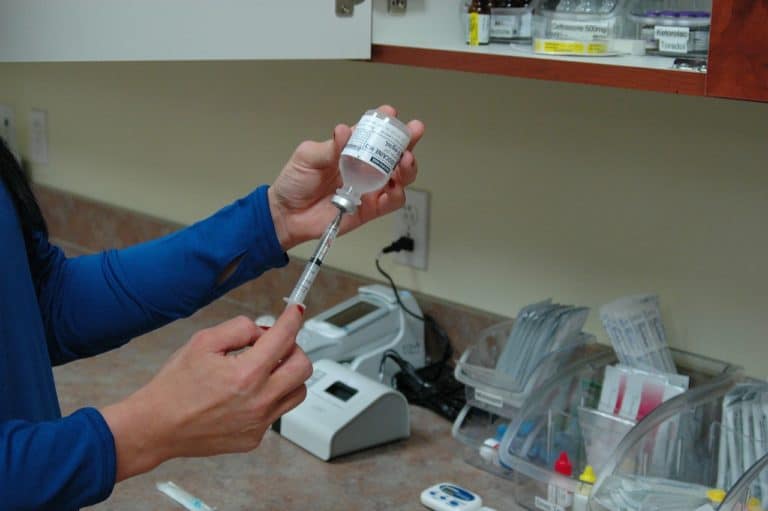Use of a special form of positron emission tomographic (PET) imaging has proven prostate cancer return (recurrence) can be detected with a high degree of accuracy. The authors of the single-arm prospective trial noted that the new approach allowed them to detect tumors that could be missed by more conventional imaging.
Prostate cancer return
After men with prostate cancer have been treated with prostatectomy or radiation, there is a chance the cancer may recur. That is, some prostate cancer cells have survived initial treatment. After prostatectomy, PSA (prostate-specific antigen) levels usually decline in the blood and eventually are not detectable. Following radiation treatment, PSA levels usually drop to a low level.
However, in some men, PSA levels begin to rise, indicating that a local or distant recurrence of the cancer may be occurring. Local recurrence means the cancer has appeared next to the prostate or in the seminal vesicles, lymph nodes in the pelvis, or muscles in the pelvic region. Distant recurrence refers to cancer that has spread (metastasized) through the bloodstream or lymph channels to the bones or other organs. In all cases, additional testing is necessary to locate and hopefully treat the cancer.
Locating new prostate cancer tumors can be challenging. Often they are too small to be detected using standard imaging such as magnetic resonance imaging. However, it is critical to locate the tumors before they have an opportunity to grow and spread further.
New test for prostate cancer recurrence
Researchers from the University of California, San Francisco (UCSF) and the University of California, Los Angeles (UCLA), evaluated use of a modified PET scan, the 68Ga-PSMA-11, in men who had undergone prostate cancer treatment and experienced rising PSA levels. PET scans are typically performed by first injecting a minimally radioactive tracer into the bloodstream. The PET scan can detect the radiation and thus locate cancer cells in the body.
Currently there are two FDA-approved tracers: choline C11 and fluciclovine-18-F. In this study, however, the researchers used gallium-68, which has been shown to attach itself specifically to prostate-specific membrane antigen (PSMA), which is highly expressed on cells that have spread.
Gallium-68 has not yet been granted regulatory approval in the United States for this purpose, although it has FDA approval for neuroendocrine tumors.
A total of 635 men (median age, 69) participated in the study. The majority (41%, 262) had undergone prostatectomy, 27 percent (169) had undergone radiation therapy, and 32 percent (204) had had both treatments. The men were injected with gallium-68 followed by a full-body PET scan. All of the images were interpreted by independent readers who knew nothing about the clinical state of the patients.
Based on the readers’ reports, the findings were as follows:
- Positive results were obtained in 75 percent of the men, and the likelihood of a positive finding increased as PSA levels rose. That is, 38 percent of the men with a PSA of 0.5 ng/mL or less were detected by the scan vs 97 percent of those with PSA levels of 5 ng/mL or greater
- The probability that the scan would accurately detect cancer (known as the positive predictive value, or PPV) ranged from 84 percent to 92 percent
- The highest PPVs were those of the pelvic lymph nodes and the lowest were those of the lower ribs
- No adverse events were associated with the use of the 68Ga-PSMA-11 PET imaging
Why this study is important
According to radiologist Dr. Thomas Hope, of UCFS’s School of Medicine, who headed the study, one thing that makes this research exciting is that some of the detected prostate cancerous tumors were “still curable with targeted radiation therapy.” If use of gallium-68/PSMA scanning gains approval from the FDA, it may mean a better outcome for men with recurrent prostate cancer. For now, more research is needed for this new PET approach.
References
The Carcinoid Cancer Foundation. Gallium 68 PET/CT scanning for neuroendocrine tumors—information and locations (updated January 26, 2019)
Fendler WP et al. Assessment of 68Ga-PSMA-11 PET accuracy in localizing recurrent prostate cancer: a prospective single-arm clinical trial. AMA Oncology 2019 Mar 28
Schmidt C. Highly accurate test reveals recurring prostate cancer. Harvard Medical School 2019 Apr 29







